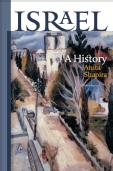From My Bookshelf: ISRAEL-A HISTORY by Anita Shapira
 About 18 months ago, I purchased a new book for my Kindle: Anita Shapira’s Israel: A History (translated from the Hebrew by Anthony Berris). But soon after that, I began attending a weekly seminar titled “Zionist Thought and Statesmanship”; that wonderful course came complete with its own considerable reading list. I put aside Shapira’s book for another time.
About 18 months ago, I purchased a new book for my Kindle: Anita Shapira’s Israel: A History (translated from the Hebrew by Anthony Berris). But soon after that, I began attending a weekly seminar titled “Zionist Thought and Statesmanship”; that wonderful course came complete with its own considerable reading list. I put aside Shapira’s book for another time.
It’s not that I’m glad that it has taken me so long to return to the book, which I’m about halfway through right now (I’m reading slowly). But I can’t help feeling that approaching it with at least a little more knowledge of Israeli history already in my mind has enriched my reading experience. Similarly, what I’ve read so far in Shapira’s book has reinforced and complemented the readings from my earlier seminar very, very nicely.
I’m not quite prepared to write a review of my own, but I’ll point you to some reviews that piqued and sustained my interest in the book over time. In the meantime, I can assure you that this is a book very much worth reading.
P.S. Yesterday came the tragic news about the three missing boys in Israel. It’s hard not to feel totally helpless and devastated at a time like this. But thinking of those boys and filled with the spirit of Jewish peoplehood, I will do something simple: continue my reading, mindful of my connections to Israel, and to those boys (one of whom is also connected through our common American citizenship).
